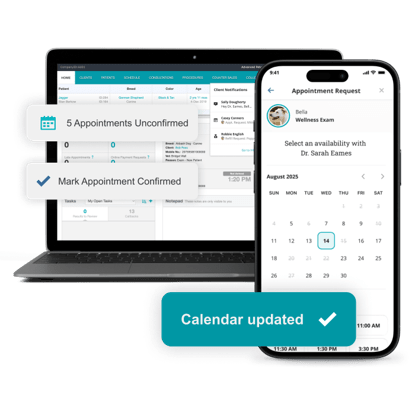The Key to Increasing Veterinary Practice Revenue: Client Education and Preventive Care

When looking for sustainable solutions to grow practice revenue, many veterinary teams focus on expanding their offerings. However, increasing client education and preventive care can be the most effective strategy. By proactively teaching pet owners about the importance of wellness and making preventive care accessible and easy to follow, you can improve patient outcomes, strengthen client loyalty, and boost your bottom line.
Preventive care
Preventive care is essential for detecting health issues early, avoiding costly emergencies, and helping pets live longer, healthier lives. It also provides a consistent opportunity for increasing practice revenue. Benefits include:
- Improved compliance — When clients understand the value of preventive care, they are more likely to agree to vaccinations, wellness exams, bloodwork, and parasite prevention.
- Increased appointment volume — Wellness visits help maintain a steady flow of patients year-round.
- Additional services — Discussing nutrition, dental care, and behavior during wellness exams can lead to add-on services and purchases.
- Higher client satisfaction — When pet owners feel informed, they are more likely to follow your recommendations and return for future care.
Pet wellness plans
Pet wellness plans benefit pets, clients, and your veterinary team. These plans offer a structured, budget-friendly way for pet owners to stay on top of preventive care, promoting better health outcomes and contributing to long-term practice revenue growth.
Wellness plans are preventive care packages that bundle services such as annual wellness exams, core vaccinations, parasite testing and prevention, routine diagnostics, nail trims, and other basic services. Clients typically pay for wellness plans through a monthly subscription model, which makes routine care more accessible and financially manageable.
When clients enroll in pet wellness plans, they’re more likely to bring their pet in for recommended services. The monthly payments serve as a built-in reminder and commitment, helping clients stay consistent with their pet’s healthcare. This means fewer missed vaccines, more timely parasite prevention, better disease detection through routine diagnostics, and stronger client-patient relationships.
Wellness plans also generate steady monthly practice revenue. The recurring income stream helps practices stabilize their finances, plan for growth, and maintain operations even during slower seasons.
Educating clients
Client education is one of the most powerful marketing and practice revenue-boosting tools because pet owners must realize the value of preventive care to act on your recommendations.
Key strategies for effective client education include:
- Start early and reinforce often — Begin educating clients during their first visit and continue the conversation throughout each stage of the pet’s life. Reinforcement builds retention.
- Use visuals and analogies — Charts, models, and infographics can simplify complex medical concepts. Your team can also compare pet wellness to human health care—most people understand the value of regular dental cleanings and physicals for themselves.
- Customize communication styles — Tailor your messaging to each client. Some may prefer in-depth explanations, while others appreciate bullet-pointed takeaways. Ask questions to understand what resonates.
- Leverage your website and social media — Use blogs and videos to answer common questions and reinforce key topics. In addition to defining you as a trusted source, this drives traffic to your website, strengthening your online presence.
- Train your team — Ensure your entire veterinary team communicates consistently and reinforces messaging about wellness care. When clients hear the same message from multiple people, the information gains credibility.
- Provide take-home materials — Written instructions, brochures, and follow-up emails ensure clients don’t forget what they learned during the visit. Link to educational content on your website or trusted resources such as AVMA or AAHA.
Pet owners want to feel confident they are doing everything possible to keep their four-legged family members happy and healthy. When the veterinary team takes the time to educate them, answer questions, and provide proactive care, trust grows, helping the client remain loyal for years to come.
The bottom line
Incorporating client education and pet wellness plans into your practice model is a smart strategy and the key to sustainable growth. By helping pet owners understand the value of wellness visits, diagnostics, and parasite prevention, you build trust, improve patient outcomes, and create consistent revenue streams for your practice. With a proactive approach and a well-trained team, you can help your clients feel informed and empowered to invest in their pet’s health.
Want more content like this?




